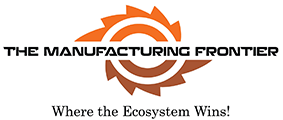“Going passwordless thus becomes paramount, especially with the advent of smart factories. With smarter MFA methods, the manufacturing sector stands to drive greater productivity, efficiency, and speed of operations than hitherto made possible.” Siddharth Gandhi, COO – Asia Pacific, 1Kosmos
Today, the world is going passwordless! Passwords are being replaced by smarter, identity-based biometric authentication methods.
Tech giants like Google, Apple, and Microsoft have significantly improved their security and convenience for users by either offering passkeys or opening up to third parties to offer passwordless solutions. Leading banks have adopted hardware tokens or mobile app-based access to minimise the risk of unauthorized access. Healthcare and government organizations are safeguarding sensitive patient data and offering secured access through private keys and biometric systems.
Clearly, the manufacturing sector has not remained insulated from being swept across by this wave of change. When one of the world’s largest industrial automation and digital transformation company adopted a passwordless authentication method, the results were astonishing! The firm not only improved security and user experience, it successfully reduced the reliance on traditional passwords, thus significantly bringing on the help desk reset costs. Another pharmaceutical manufacturer deployed MFA for 3,000 users, thus enhancing overall security and completely ending business email compromise.
These are not isolated instances. Instead, the advent of passwordless multi-factor authentication systems is here to fuel digital transformation of the manufacturing sector. In India, the manufacturing sector employs over 27 million people and contributes 17% to the nation’s GDP. The sector is certainly looking to drive greater efficiency, as witnessed with the growing adoption of Industry 4.0 Technologies, i.e. IoT, Robotics, and Artificial Intelligence.
Going passwordless thus becomes paramount, especially with the advent of smart factories. With smarter MFA methods, the sector stands to drive greater productivity, efficiency, and speed of operations than hitherto made possible. However, the challenge remains. The advent of smart factories imposes greater challenges for deskless workers, on whose shoulders the industry rests.
Smart Factories & Unique Challenges
Completely indispensable to the manufacturing sector, deskless workers represent the main operational force and 80% of the entire global workforce. Thus, any disruption to deskless workers could potentially cripple the operations.
However, in India, deskless workers don’t have the same access to IT support and training, as their office-going counterparts. Fast-growing smart factories may find traditional authentication methods obsolete and time-consuming. At the same time, deskless workers may struggle to secure digital access points for important tasks like reporting, inventory management, machine controls, quality assurance, etc. For today’s smart factories, every connected system is a potential vulnerability, thus making secured access completely non-negotiable.
The Paradox of Smarter Authentication
As factories have gotten smarter, so have the cyberattacks. This makes increased security efforts a top priority for every organization. Thus arises the paradox – how to increase security while making it frictionless for deskless workers to adopt the same best practices? Enters next-gen authentication solutions that simplify access and enhance security. Password-based authentication is time-consuming, obsolete, and makes the organisation more vulnerable to security threats. However, the latest advancements in identity verification and access management allow for secure and passwordless access.
It relies on Multi-Factor Authentication (MFA), allowing workers to authenticate via biometrics: Liveness detection/facial recognition/fingerprint. This approach further reduces the risk of phishing, ransomware, and data breaches. Innovation has allowed us to bring in new capabilities which reduce the Total Cost of Ownership (TCO) and not having the enterprises to spend significant amounts towards such solutions like individual hardware tokens.
The Future is Passwordless: To drive greater efficiencies and scale without disruptions, organizations today need to adapt and evolve with Industry 4.0 Technologies. At the same time, it is mission-critical for them to resolve the woes of deskless workers. Going passwordless thus emerges as a plausible solution to this conundrum.
Complete Protection: Passwords can be forgotten or stolen – creating a nuisance and depriving the workers of productive time. Besides, passwords increase the risk of phishing, ransomware etc. Going passwordless completely mitigates these risks.
Foolproof Data Security: The authentication in biometric systems, furthermore, is linked to both private and public keys. Thus, even in scenarios where the public key gets compromised or hacked, the biometric data and sensitive information remain out of reach.
Better Cost Efficiency: As per Forrester Research, a single password reset costs $70. Going passwordless, thus, brings about substantial cost savings, let alone time and effort spent in resetting passwords. Freed up time and money can then be spent on furthering the organisation on its mission-critical agendas.
Smooth Operational Flow that Feels Intuitive: In a manufacturing unit, time is of the essence; and passwordless access ensures a smooth operational flow, round-the-clock. Whether it is gaining access to a manufacturing floor or operating equipment, all of it is made simple with quick and easy biometric access.
Permission-Based Access Simplified: High-security manufacturing companies can also deploy the same to limit workers’ access to sensitive areas. Essentially, it removes the friction or downtime due to multiple logins, while giving organizations an effective and smart way to exercise secured control.
Continuous Verification throughout Session Time: Continuous verification ensures no disruption in workflow, even when a worker switches to a different location or device. This becomes even more important in factories where deskless workers may need to access different devices or switch stations throughout their shifts. It, furthermore, restricts access to authorized personnel, even if the devices are left unattended for a brief period, a common occurrence in manufacturing units.
Seamless Compliance with Evolving Standards: The manufacturing sector faces stringent regulations, as it handles sensitive data. Going passwordless helps mitigate regulatory and compliance challenges. It integrates adaptable frameworks, keeping the system better aligned with the evolving regulatory mandates, thus minimizing the risk of non-compliance and safeguarding the organization’s reputation.
Flexible Deployment for Easy Adoption: Going passwordless may sound complex; in fact, it calls for a cultural shift in the organisation. While overhauling existing systems can be daunting, modern authentication platforms offer quick deployment in phases and offer immediate Proof of Value (POV) to stakeholders. For the interim, employees may use both traditional and passwordless options. This flexibility makes it easier for organizations to adopt advanced passwordless authentication while helping employees to be at par with the advancements.
“The advent of smart factories is transforming the manufacturing sector. However, its full potential can only be realized with robust security measures.”
In Conclusion: Secure the Future for Manufacturing!
The advent of smart factories is transforming the manufacturing sector. However, its full potential can only be realized with robust security measures. By leveraging advanced technologies like blockchain, AI and decentralized identity frameworks, identity-based passwordless MFA systems usher the organizations to another league of enhanced security and ease of use. They further empower deskless workers with streamlined access, thus driving greater operational efficiency. Driving major cost savings and mitigating the risks of non-compliance, these methods have become vital for the future of the manufacturing sector.
The writing on the wall is clear: enhanced security and seamless access via smarter authentication is no longer optional, it’s essential! As India aspires to stay at par with the leading economies of the world, adopting passwordless solutions are going to be pivotal in fueling productivity and safeguarding against advanced cyber threats. Manufacturers embracing these advanced solutions today, will be leading the sector tomorrow.
By Siddharth Gandhi, COO- Asia Pacific at 1Kosmos

